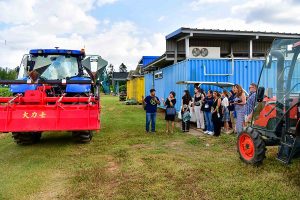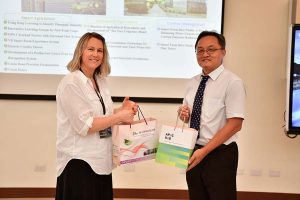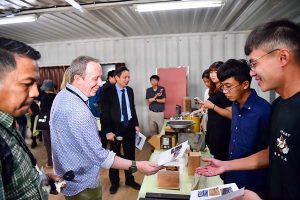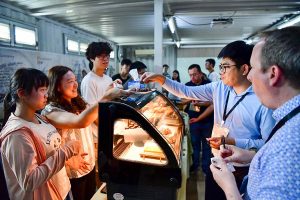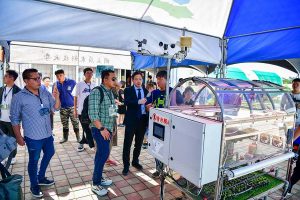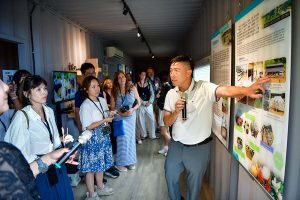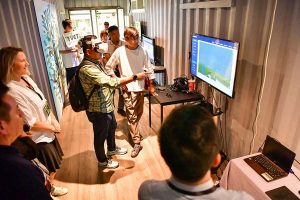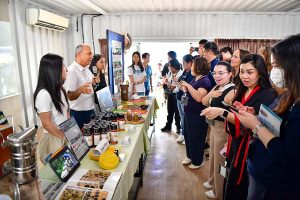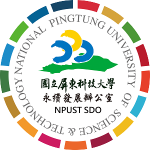The Ministry of Education (MOE) Working Group to Internationalize Technological / Vocational Education in Taiwan held the “2024 APEC Industry-Academic Collaboration Workshop” on August 28th and 29th this year. The theme of the workshop gave focus to the best practices models for inclusive innovation, digital sustainability, and cross-domain of talent development. NPUST was invited to serve as a co-organizer for the event, and arrange a visit the school’s Sustainable Development Office, Smart Agriculture Center, and one of its industry partners, the TCI Group. On August 29, ten workshop staff members from Taipei University of Technology accompanied Ms. Katrina Sutich, Group Manager of Tertiary Education at Ministry of Education of New Zealand, and 27 others representatives from 12 APEC economies including from Canada, Hong Kong, Indonesia, South Korea, Malaysia, Mexico, New Zealand, the Philippines, Singapore, Thailand, the United States and Vietnam on a visit to the campus. NPUST Vice-President for Education Shang-Min Ma delivered a welcome speech on behalf of the school, and was joined by Vice-President for Administration Wen-ling Shih, Chief Secretary Fang Ming Lin, Vice-Dean of International Affairs Yuh Tzean Zeng Yu, Professor Herlin Chien, and Assistant Professor Fang-Yi Liu for the reception of the visitors.
While visiting the university’s Big Data Center, Professor Herlin Chien, who serves as Deputy Executive Director at the NPUST Sustainable Development Office, provided details on the work the school is doing with respect to sustainable development. Afterwards, she arranged for a visit to Smart Agriculture Center.
The NPUST Smart Agriculture Center was established to promote the development and integration of smart technologies applicable to the agricultural sector. At the center, cross-disciplinary teams whose members come from such fields as agriculture, engineering, management, humanities, veterinary medicine, international studies, and other professional areas of research work together to promote Sixth Level industries through the development of various products and systems. With the only industrial-level crop cultivation and circular agriculture demonstration site in the country, the center is used to conduct practical education in production, environmental monitoring, machine R&D, big data collection, Internet of Things, food processing, marketing and more. It is also the home of the first technical college-operated “crop cultivation and recycling center” in the country.
While visiting the center, the visitors observed a variety of research results including smart vehicles, the smart greenhouse, tropical orchard bee breeding technology, image recognition systems, carbon sink calculation systems and drone technology. Afterwards, the guests were taken on a visit to one of NPUST’s industry partners, the TCI Group. TCI is an ISO50001 energy management certified biomedical company whose practices have allowed it to achieve carbon neutrality and earn it recognition from the Science Based Targets initiative (SBTi).
In recent years, NPUST has been working to incorporate sustainable development into its school governance policies and has actively put the United Nations SDGs into practice. Thanks to the efforts of so many of her teachers and students, the university has frequently won awards and enjoyed outstanding performances in relation to school governance, environmental sustainability, and university social responsibility (USR)—and has won recognition both at home and abroad. The MOE’s choice to incorporate NPUST into the APEC Industry-Academic Collaboration Workshop and the positive response it received from the APEC representatives is yet another example of the positive impact the school is having when it comes to innovation, sustainability, talent cultivation and good practices.







